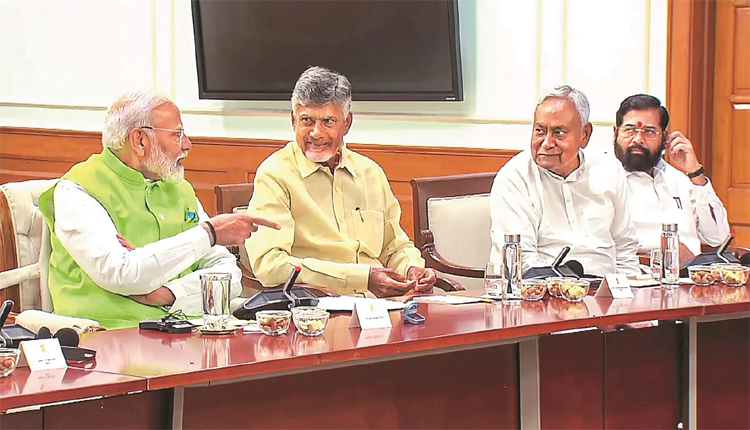New Delhi: Overcoming resistance in both chambers of Parliament, the Modi government has passed the Waqf Amendment Bill 2025. Whereas in the Rajya Sabha, the measure was passed with 128 votes in favour and 95 against it, in the Lok Sabha, it was carried with 288 votes in favour and 232 against it. The measure has passed Parliament and awaits the President’s approval to become legislation, notwithstanding strong resistance from opposition parties. This victory not only advances the government’s political agenda but also shows its ability to manage coalition politics properly, therefore strengthening its message to its critics.
Particularly because the Bharatiya Janata Party (BJP) lacks a majority in itself, the Modi government’s passage of the Waqf Amendment Bill was not an easy ride. Having just 240 seats in the 2024 elections—less than the 272 needed for a majority—the BJP mostly relied on its allies in the National Democratic Alliance (NDA). By asking such allies as Nitish Kumar’s Janata Dal (United) (JDU), Chandrababu Naidu’s Telugu Desam Party (TDP), Chirag Paswan’s Lok Janshakti Party (Ram Vilas), and Jayant Chaudhary’s Rashtriya Lok Dal (RLD) to vote against the bill because it had a connection to Muslim properties, Muslim parties and opposition groups sought pressure on such allies. Still, these supporters did not waver, ignoring Muslim vote bank concerns and fully supporting the Modi government.
This success reflects the BJP’s mastery in coalition politics. Given his earlier experience ruling with a clear majority as Gujarat’s Chief Minister from 2002 to 2014 and as Prime Minister from 2014 to 2024, political pundits had questioned Prime Minister Narendra Modi’s capacity to run a coalition administration. Modi ruled without allies in his first two terms, but in 2024 the NDA’s 28 seats from JDU and TDP allowed him to gain a third term. With some even thinking that Modi would have to postpone his agenda, balancing coalition needs would prove difficult. But he has shown he can lead a coalition and follow his goal by having the Waqf bill passed.
To stop the measure, the opposition has been putting its hopes on allies like Nitish Kumar and Chandrababu Naidu, who rely on Muslim votes in areas like Bihar and Andhra Pradesh. Muslim groups, including the All India Muslim Personal Law Board, feared the bill would be used to seek government intervention into Waqf properties, therefore sparking demonstrations and boycotts of NDA allies’ activities. With the likes of JDU’s Sanjay Jha and TDP’s KP Tenneti promising that it helps Muslim women and impoverished communities, the BJP allies not only helped the bill but also fervently promoted it in Parliament even then. This cohesiveness quieted detractors who claimed Modi had the skills to govern a coalition.
The BJP held more than a dozen meetings in the past year to persuade friends by stressing the importance of the bill and including 14 revisions suggested by allies like JDU and TDP following its referral to a Joint Parliamentary Committee (JPC). While the TDP pushed Chandrababu Naidu’s activities in Andhra Pradesh, leaders like Lallan Singh and Sanjay Jha of JDU emphasised Nitish Kumar’s social care for Muslims. The Modi government turned a potential obstacle into a victory by tying their allies with the goals of the bill—safeguarding Muslim interests instead of communalising people—showcasing that even on divisive issues, its coalition can deliver.



Comments are closed.